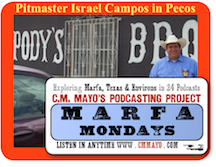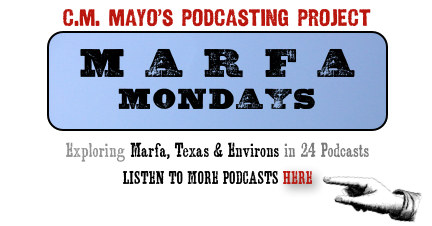|
Author of The Last Prince of the Mexican Empire, etc. |
|
|

|

|

|
|
PITMASTER ISRAEL CAMPOS IN PECOS |
|||
 |
|||
|
(APPROX 25 MINUTES) |
|||
|
|
|||
|
Well, there is quite
a bibliography on American barbecue and a drool-worthy subset
of that is on Texas barbecue. Daniel Vaughn is also the barbecue columnist for Texas Monthly. (Yes, they have a barbecue columnist.) On the Texas Monthy BBQ website Vaughn writes, "Texas barbecue, the classic version of which is found primarily in Central Texas and distinguished by its use of beef brisket and its indirect smoking method, is superior to all other regional varieties of barbecue. This is an incontrovertible fact." In Legends of Texas Barbecue Cookbook, Robb Walsh says of this giant of barbecues, "We love to eat it. We love to make it. And we love to argue about it." [MUSIC] Now for podcast number 19. Vegetarians... you might want to skip this one. [MUSIC] Israel Campos: So you've had it. C.M. Mayo: I had it yesterday. I had the chopped brisket and today I had the pulled pork sandwich. Israel Campos: Pulled pork sandwich, oh great. C.M.
Mayo: Thumbs
up! So everybody rings the bell when they like it, so I rang
the bell yesterday. I'll ring it when I go out today. Israel
Campos: Yes,
we were in the top 50. Yes, ma'am. C.M. Mayo: And you made that list. Israel
Campos: We
made the top 50, and then for pulled pork, we were fourth in
the nation. C.M. Mayo: Well, I just ate that! I just ate that and it was really, really, good, but it was such a generous portion I had to ask for a clamshell so I could have the leftover for dinner. Israel Campos: That's great. C.M. Mayo: Well, that's what I did with the chopped brisket. It was so much I couldn't eat it all so I had it for supper. Israel Campos: Portions are big around Texas. We try to treat our customers right. C.M.
Mayo:
You sure do. C.M.
Mayo: Well,
yeah. It's a good deal. It's a good deal. It's really two meals
in one, at least for me. Maybe for some other customers I see
in here, who like they're... C.M.
Mayo:
Yeah, they're working in the oil fields. They probably eat the
whole thing. Israel
Campos: Well,
I started in 2011 after some personal setbacks. I got laid off
from a job, a government funded job. 2011 was kind of rough.
I just didn't have anything to do. I mean, I always work with
my hands. I had already gone through a bunch of barbecue restaurants
around the state. With my travels with a former company that
I worked with, I saw this building here. It's a former laundromat.
Used to be a laundromat here. I told my wife, I'm going to do
something risky and take my retirement out and buy it. And I
checked on the prices and went ahead and bought it. Did a little
bit of remodeling. First thing then I went a bought a big pit.
Then, later on, used my brother's pit, which we still use. Israel Campos: It's actually outside right next to the building. It's adjacent to our building. C.M. Mayo: It's underground? Israel Campos: No. No. No, it's a steel barbecue pit. It's a pipe— C.M. Mayo: It looks like a drum. Israel
Campos: Yes!
I'll show it to you here. I have that and two other pits that
we use for large catering jobs. C.M. Mayo: Yeah, I saw that. They have a dedicated barbecue section in every issue. Israel Campos: Yes, and that's Daniel Vaughn. He's a good guy. Met him several times. He's part of the reason we are so successful. And the food, of course, and the ladies working here. C.M. Mayo: So it's your mom and your wife? Israel Campos: My wife, my aunt and my sister-in-law and my family friend. C.M.
Mayo:
So it's your family. So this is really a family business. In
this day and age of chain stores everywhere! That's really special. C.M. Mayo: Are you from Pecos? Israel Campos: Yes. I was born and raised here. C.M. Mayo: So you've seen changes in the town. Israel Campos: Oh, yes. Tremendously. The oil field has…while I've been alive, I was born in '74, we've gone through two oil booms. The first one, back in the early to mid-80s, came and went and we learned from that because there was a lot of investing done and a lot of bad investments done by a bunch of different groups and the money was spent really quick. Now, this next boom, this boom that we're going through right now, people seem to have invested a little bit smarter and more slower about wasting their money, or spending their money. Wiser than from the first one. I mean, I've seen an increase in traffic. Increase in housing. Houses haven't been built like they're being built now. Hotels, apartment complexes, like they're going up now. C.M. Mayo: Yeah, there's La Quinta and Holiday Inn and Motel 6, and just about all the major chain hotels are out there, and RV parks, and.. well, and your restaurant. I was here yesterday and here I am today. It was so good I had to come back! Israel Campos: We're glad to have you. C.M. Mayo: Well, it really was good and it's packed, every day. It's absolutely packed. Israel Campos: We sell out every day. We make a limited amount, but it's enough to keep us going, pay the bills. C.M. Mayo: You're open from 11 to 2:30. Israel Campos: Yes. Until we sell out. Generally about 1:30, 1:45. On a busy day, sometimes it's occurred that we're sold out by about 12:30. Mid-lunch. When the oil field was really booming, I think we had like 65, 68 rigs around the county and we were feeding a lot of those rigs. A lot of that food that went out to the rigs was being bought here. Those are our 12 o'clock sellouts and 12:30 sellouts. C.M. Mayo: Wow. That's impressive. Well, how did you learn how to barbecue like this? Israel Campos: Growing up, my grandfather…all of the only experience I had with barbecue—barbecue to us was like cooked goat, cabrito. It was more the traditional type of barbecue that I grew up on. C.M.
Mayo: Now
is that barbecue that's buried with nopal leaves? C.M. Mayo: Okay, like in Mexico. Israel
Campos:
Yeah. We used burlap sacks instead of — Israel Campos: That's it. That's how I learned what barbecue was. And then later on above ground, with just the embers, cooking on the embers and cooking the goats like that. I didn't find out until the brisket, later on, when I was working with this company, TMPA—it's a police association out of Austin. I did a lot of traveling, a lot of training for law enforcement across the state and I started visiting the Central Texas barbecue market down south. Down in like McAllen, Mission area. Just kind of picked and chose what I liked and put it all together. I would visit a lot of the backyard barbecue places and the hole-in-the-wall, as they say, and learned a lot from those pitmasters. Just went in and picked their brain, just in case…my whole future in retiring was, I'm going to retire one day and open up my little barbecue place. C.M.
Mayo: So
you always knew you wanted to do this. Israel Campos: Yes. It came by necessity sooner than what I thought, and it's been successful. We're very fortunate and blessed. C.M. Mayo: So you really had focused on the technique, and that's not easy to learn. Israel Campos: No. No. No, a lot of trial and error. A lot of burnt brisket, a lot of undercooked stuff. We found out the hard way. And once you master something, you want to buy something bigger and then you have to master that. C.M. Mayo: So cooking a small piece of meat is really different from cooking a big piece of meat. Israel Campos: Oh, yes. Yes. The larger amount gets the more attention. Temperatures vary. There's a lot of variances in the pit with temperatures. You have to have it consistent. You have to know what the pit air intake and exhaust and... You have to kind of learn the pit. And then from there, I kind of passed that information on to my wife and my mother who tend the barbecue pit when I'm not around. They seem to be doing a good job. C.M. Mayo: Oh, I'll say. I'll say. Israel Campos: They're the pitmasters. C.M. Mayo: And the sauce! The sauce also, is really good. Do you guys make that here? Israel Campos: Yes. Yes, it's made in-house. We use a base sauce and then we add our own ingredients. Like the hot sauce, we actually do here, we cook it here. Our little sweet sauce that we have, as well. C.M. Mayo: It's a sweet sauce and a hot sauce. I'm looking at both. The hot sauce has the "CAUTION" tape on it. It's really hot for some people. Israel
Campos: We
had folks that had come in and we did not have the labeling on
it and they would shower their brisket or shower their ribs and
then they'd be like, oh, that's the wrong bottle. You
know, sorry. C.M. Mayo: But barbecue varies from place to place. Would you say that barbecue, how you do it here west of the Pecos, is different from the barbecue you might find someplace else in Texas? Israel Campos: The foundation's kind of similar, but we do have our own ingredients. Our own, I could say, regional type of cooking that we do. I cook it, like many other folks, in an offset, indirect heat pit. And it's kind of the same technique but just kind of some variances due to the location, you know, how far out we are from any big trees. We don't have any big trees around, so I have to import a lot of my wood that I use. C.M.
Mayo: Oh,
so it's cooked over actual wood. Israel Campos: Depending on the season, but we use a lot of mesquite, post oak that we get from Brady, out the San Angelo, Brady area. We use some pecan and some cherry wood from New Mexico. That's kind of different than what other barbecue restaurants, area-wise, use. C.M. Mayo: So it gives the meat a very different flavor. Israel Campos: Yes. Flavors vary with the different types of wood. The different spice you use. C.M. Mayo: And you prepare the meat before you cook it in a marinade or a rub? Israel Campos: No. We use a dry rub. Consists of salt and pepper. That's it. C.M. Mayo: So it's really good quality meat. Israel Campos: Yeah. Yeah. Yes, it is. C.M.
Mayo: I
mean, it's really…I must say, my respects. My respects.
Israel
Campos: I
like the pulled pork. C.M.
Mayo: I'll
say! That was outstanding. I just about inhaled it. [Laughs] Israel Campos: Yes. Trip Advisor. Yelp. Urbanspoon. Google. We don't tend to rely on that, but it does draw customers. Hey, I saw you on Trip Advisor and they say, you know how it's so hard to get four and five stars and you guys have five stars across the board or, you guys have ten five stars! We pay attention to what the customer wants. Other restaurants will tell you, No, that's just the rumor mill or that's just whatever, but it's actually what the people are saying and you know, the public generally rules. The majority rules. If the people are saying good stuff about you, it means you're doing good stuff. You can't be good all the time, you can't be bad all the time, either. We take it as it comes and we move on. We learn from our mistakes. And like I said, there was a lot of trial and error at the beginning. C.M. Mayo: Well, I know... my husband learned to do a little backyard barbecue, like a Weber [charcoal grill], and that was a learning experience. I didn't do anything except I provided the chimney, you know, I brought a little chimney [charcoal starter] and I mixed up some sauce. Other than that, I have no experience in barbecuing. But I know that little bit to know that it's not easy to learn how to do it. And to do this quantity every day... How many pounds of meat are you bringing in every day to cook? Israel Campos: Well, we cook at least, ah, close to about three hundred pounds a day. C.M. Mayo: Wow. That is impressive. [MUSIC] Israel Campos: Yes, they do. The pozole. I don't know if…did you try it? C.M. Mayo: I didn't try it. I had the green beans and the potato salad. Israel Campos: Actually, it's a different version of the traditional red sauce with the corn, hominy and pork. This is just the hominy with some cream and green chiles from New Mexico. It's called… it's the Southwest version of it. C.M. Mayo: Oh, okay, because in Mexico City they serve it like a soup. Israel Campos: Like a soup, like menudo. C.M. Mayo: Yeah, but this is more a side dish. Ah, it sounds good with green chilies. Israel Campos: Green chiles. Hatch Green New Mexico chiles and white cream. It's really good. It's one of our main sellers. Side sellers. C.M.
Mayo: Oh,
really. Oh, now I feel bad that I didn't try it. I'll have to
come back. Israel Campos: I would say over-spicing the meat. Keep it basic. Don't over-spice the meat. And get you good cuts. You get what you pay for, so if somebody's selling you a two-dollar steak, it's probably going to taste like a two-dollar steak. C.M. Mayo: Good meat and very simple preparation. Israel
Campos: Yes,
very simple preparation. Keep it simple. Cook with wood. C.M.
Mayo: Yeah. C.M. Mayo: So if you want to cook with mesquite, you've got to cook with the real thing, with mesquite. Israel Campos: Yeah. They sell bags at your local grocers. Cook with wood for any type of meat, chicken, pork or beef. C.M. Mayo: Can we have a look at the pit outside? [MUSIC] Oh, a wagon full of meat there. Wow. Israel Campos: Yeah. That's going out, we let it rest a little before we put it in here. We don't like to put it in like really, really cold. C.M. Mayo: Oh, okay... so it's these big barrels, and they open it up with a handle. Pulls it up. Israel Campos: That's all the pepper... and its offset, see the fire's on that side there? C.M. Mayo: Oh, so the fire's in the smaller barrel on the right. Israel Campos: That's called the firebox... all our the heat's generated.... C.M.
Mayo: Oh,
that's hot! We're looking at a piece of charred wood and a pile
of ash. Israel Campos: That's wood there, and that's oak down on the bottom. Live oak. And this is our mesquite wood here. It's all from the San Angelo area. Anything we use around here would be like mesquite root. West of Pecos, you know, you hardly get any type of big oak unless you're up around the mountains and the mesquite wood is really difficult to get, like the big trees, since we only have brush. C.M.
Mayo: Yeah,
out here in Pecos, this is brush country. Israel Campos: Exactly. We truck this in from Fort Stockton. They have pecan orchards west of town and I get a lot of pecan out that area as well. C.M.
Mayo: I'm
looking at a gigantic barrel with a big chimney and three big
handles to pull up and put meat in there, as well. Israel Campos: That's the firebox and it's on the same side of the exhaust there, the big pipe exhaust.And what it does, it's called "reverse flow." We have a plate that runs right in the middle of that tank there, and it shoots out the heat and it keeps the heat even. It's an evener…it's a more even heat as it comes out back in here. So it's really not directed right at this area here of the pit, it runs straight through and then comes back up through the top. C.M. Mayo: And what time do you guys start cooking in the morning? Israel Campos: Actually, we start today. We cook overnight at a really slow heat. About 245 to around 265. We try to keep it right in-between there, and it generally, it's got good rendering on the meat. It allows for the fat to render real slowly. It's like a really slow cooking process. C.M. Mayo: These are not cooked to order. These are cooked a long time in advance. Israel Campos: Yes. We're cooking from, we start at 3:00, 4:00 p.m. We'll cook overnight. They'll be ready about 9:30, 10:00 a.m. tomorrow morning. C.M. Mayo: Oh, wow. That's why they taste so good! Israel Campos: Yeah.
C.M. Mayo: Thanks for listening. This
concludes Marfa Mondays podcast number 19, and there will be
more until there are twenty-four. As I mentioned, these
podcasts are apropos of my book in-progress, World Waiting for a Dream:
A Turn in Far West Texas. But if you're listening sometime
in the future, it is possible that it has been published. I invite
you to check it out, as well as my several other books, at cmmayo.com. Until next time. |
|||
|
|
|||
|
|||

|

